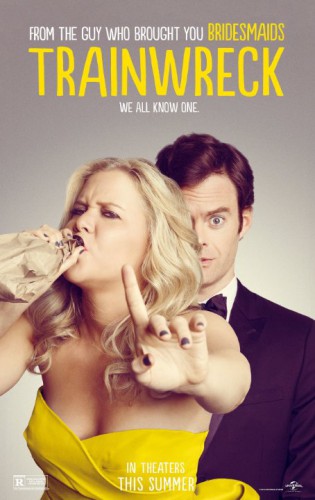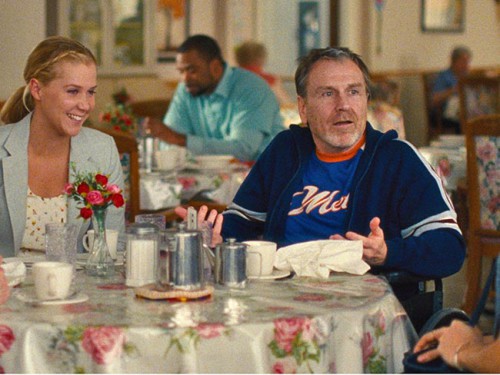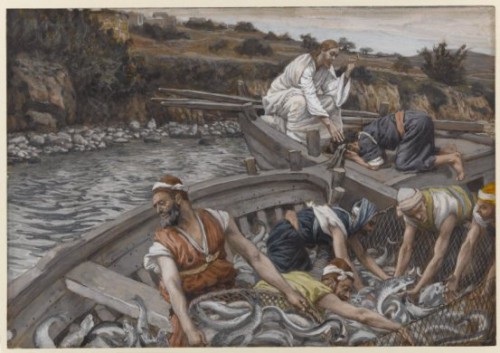

Some of you will want to slash my tires when I say this: I hated most of the movie Trainwreck. Like really hated it. I watched it at my parents’ house and, as any self-assured 31-year old girl would do, I held my finger over the “Pause” button all two hours and five minutes of the movie, lest my parents walk in during one of the many “salacious” scenes; there are parts of this movie that would make a seasoned hooker blush. My disdain dramatically shriveled though, in the manner of having a wart frozen off the bottom of your foot, in the last five minutes of the movie. But I’m getting ahead of myself. Let’s back up to the 98% that made me want to hide under a blanket.
The protagonist, Amy (played by Amy Schumer, who also wrote the screenplay), is a mess from the get-go. Let me put it to you straight: she’s a slut, an alcoholic, she’s mean, and she has ridiculous friends at a meaningless job (at least from the easy vantage point of my polished pedestal). In the opening scene, in a flashback from her childhood, Amy’s dad explains to she and her younger sister that he is divorcing their mother because “monogamy isn’t realistic.” As a girl who worshiped her father, this memory sets the stage for Amy’s own sad view of relationships. Really, it sets the stage for her entire worldview: that her job, relationships, and sexual exploits, should all be geared towards her pleasure and convenience. If someone in her life doesn’t fit into those narrow parameters of her warped low expectations, she can’t deal. The minute someone asks anything at all of her, she pushes them away.
The worst part is, Amy doesn’t see any of this. In a voiceover at the beginning of the movie, wearing a skimpy dress while leaving a strange apartment after a late-night hookup, she says, “Don’t judge me f*ckers. I’m just a sexual girl, okay? I am fine. I am in control.” The way Amy sees it, she’s living the life, totally blind to how pathetic she looks limping down the sidewalk with mussed hair and smeared mascara at seven in the morning.
 Donald Miller, an author who has a lot to say about the construct of an effective story, recently posted about the elements of a great villain:
Donald Miller, an author who has a lot to say about the construct of an effective story, recently posted about the elements of a great villain:
- A backstory of brokenness
- Un-redeemed and unforgiven pain
- A twisted vision for a better world
- Minions rather than friends or a team
- An unwillingness to admit to any fault or weakness
Look familiar? Amy fits more into the trope of villain than hero. This is not what I wanted when I paid ten jillion dollars to rent this movie! It’s terribly uncomfortable to watch someone contentedly spiraling into a nosedive, refusing to press the “eject” button.
What I really hated about Trainwreck was how much of myself I saw in the movie’s protagonist – or antagonist – or whatever tragic, off-color breed of contemporary heroine Amy Schumer has written herself into. Maybe we don’t share all the crass, nuanced similarities, but we both wholeheartedly convince ourselves that we are the rulers of our own, self-made kingdoms – and it’s all good. You’ll note that this is really the beginning of the Christian narrative.
Enter Aaron (played by Bill Hader). Aaron is an athletic surgeon for the Knicks whose star is on the rise. If that weren’t enough, he’s also involved in Doctors Without Borders, a real American hero. Amy, a writer for a men’s magazine, is assigned to interview him. He is immediately endearing (sort of handsome, a little nerdy, very smart, and friends with the likes of Lebron James). He’s perfect. The absurd thing is that Aaron seems to be endeared by Amy as well.
When Aaron calls her the morning after their first date, Amy’s convinced it’s a butt-dial. “No, I dialed you with my fingers” he says, confused. That’s what undeserved love feels like at first. A butt-dial. An accident. We look over both shoulders astonished: certainly you don’t mean, me.
https://www.youtube.com/watch?v=pQPGRPt_lBw
In spite of her picky, judgmental aloofness, Aaron chooses her. He doesn’t wait for her to stop drinking, or to be nicer and less selfish. Against all rational, he seems to like her just as she is. After Amy reluctantly agrees to date him, there’s sort of a love montage, but otherwise nothing about her really changes (other than finally being in a monogamous relationship). She’s still a hypercritical alcoholic.
Then her dad – her favorite person in the world – passes away. This is the point in any other movie when the protagonist would break. They’d have a come-to-Jesus moment and face all of their shortcomings. Will Amy finally realize the chink in her own armor and then rise from the proverbial ashes?
No. Directly after the funeral she says something nasty to her nephew and accuses her sister of never really liking their dad.
Right then Aaron says to her, “I just want you to know I really care about you, and I love you.” He loves her. Right there in the middle of her messy, stone cold death.
Maybe now we’ll see the thaw we’ve been waiting for? Nope. She’s pissed about his timing.

A few weeks later on a night when Aaron is to receive an award, at the height of his perfection, Amy hits what the viewer now assumes will be rock bottom. She walks out on his acceptance speech to answer a critical work call from her editor about running an article (“Are You Gay, or is She Just Boring?”), and then she smokes a joint in the hallway.
Aaron, with his trophy in tow, finds her. The sight of him there carrying this hard-earned award is just too much for her.
AMY: “What are we doing? What do you want? Why are you with me?”
AARON: “I love you.”
AMY: “Why do you keep saying that?”
AARON: “Because I mean it! I love you, I’m crazy about you! What do you want me to say? We’re just having a fight. You insulted me. And we’ll talk about it, and we’ll work through it!”
AMY: “What’s wrong with you that you want to be with me? I’m a drinker!”
AARON: “I don’t care.”
AMY: “I’ve been with a lot of guys.”
AARON: “I don’t care. How many?”
Next to Aaron, the picture of righteousness, Amy is so overwhelmed by her self that she pushes him away for good. Following their breakup, she finally hits the bottom of the frigid, empty barrel. She gets wasted, “tries to sleep” with her 16-year-old intern, and subsequently gets fired from her job. At long last, this movie takes a turn for the bearable. Amy, tail between her legs, visits her sister for the first time since their dad’s funeral.
SISTER: “This isn’t working for you anymore.”
AMY: “I know. I’m sorry.”
SISTER: “I know you’re sorry.”
AMY: “No. No I’m really sorry. I want you to know that I act like everything you do in your life is so wrong and stupid, but it’s just because I don’t think I can have that. I’m not okay. I’m not okay. I know what I am. I know who I am. And I’m broken.”

Here are Donald Miller’s elements of a great hero:
- A backstory of brokenness
- A crippling self doubt
- A reluctant willingness to take action
- The promise of unity with another
- A calling that is larger than themselves and somehow represents a deep longing in the audience
Look familiar? The subtleties between hero and villain are interestingly very hard to differentiate. Both hero and villain are broken. The real distinguishing marker of a hero is in the admission that something is not right with them, and then a hesitant step onward.
I hated most of Trainwreck because I don’t usually sit down to watch a movie to partake in painstaking reality. Amy’s spiral lasts at least twenty minutes longer than your typical movie protagonist. This is frustratingly, unnervingly authentic. I wanted to grab her by the ponytail and yell, “Pull the ripcord you asshole!” I (like her) am a tragic, off-color, contemporary heroine. I am an asshole. I don’t need to be reminded of it in my down time.
Or maybe I do. Because the final moments of this movie were absolute soul candy.

Amy, who previously mocked cheerleaders, surprises Aaron by performing a dance routine with the Knicks cheerleaders. She’s almost good, almost bad – which is as much as any normal girl can hope for next to a Knicks cheerleader. Aaron is mystified. She’s sort of awkward, missing some of the steps, and her high kick doesn’t even come close to cutting it. But she’s having a hell of a time up there. Aaron yells, “You’re really good!” And she really is. Then the music switches to a certain David Cassidy classic:
I think I love you,
so what am I so afraid of?
I’m afraid that I’m not sure of
a love there is no cure for.
Herein sums up so much of the problem and solution of this movie, and the problem and solution of any ruined human. We are revolting, we are loved beyond reason or measure, this love may initially feel like a curse (in that up next to it, we find ourselves so critically in need); but it is ultimately the cure.
Each day that I wake, this heroine must confess my dire brokenness, accept the transformative one-way love of Christ, and then awkwardly dance onward. What am I so afraid of?

COMMENTS
5 responses to “Afraid of a Love That There’s No Cure For: Reviewing Trainwreck”
Leave a Reply













Great thoughts Charlotte, and it was kind of fun not knowing where you were going initially. It seems like you kind of liked Trainwreck, sort of?, after all?, Um, right?
There are probably a few HBO and Showtime shows my wife and I watch that would make Trainwreck blush, so that part didn’t bother us when we watched it.
It’s interesting, I have a different bent toward what I want to fill my movie watching down time with. I think that the sparrows in the storm, who don’t even know they need shelter (let alone recognize it when they see it) are the most interesting and fascinating characters of all. I want to fill all of my movie watching down time with that.
And as long as the sparrrow/protagonist gets some glimpse of light and moves even the tiniest bit toward it…..that’s a good narrative.
I love D. Miller’s writing and I like his antagonist/protagonist distinction here, but I think it’s a little too pronounced. The only thing I need to see to turn the villain into the hero is a slight head turn toward that little crack of light that came completely out of nowhere…….roll the credits.
Great review, Charlotte. Grace shows up in unlikely places, does it not. But that’s what makes it grace. And thanks for affording me the opportunity to not have to watch Trainwreck to learn from it, since I find raunchiness aesthetically displeasing and Amy Schumer’s comedy even more so.
Now I want to watch this! I have to ashamedly admit that Amy Schumer’s comedy seems less palatable to me because she is a woman, but watching a bit more of her, she’s extremely bright and self aware (hello Louis CK) and while her character was oblivious, she is certainly not….a big part of the difference that you point out via Miller in the twisted vision of a better world/unwilling to see one’s faults versus the self-doubt/deep longing. Awesome post, thanks
Thanks, Charlotte. This is a great review.
Your assessment of Amy Schumer’s character is similar to how I feel about Barney Stinson in “How I Met Your Mother.” He only turns around when faced with his previously unwanted child who was the result of a particularly disgusting one-night stand.
I’m not a fan of Apatow’s movies, Lebron James or Amy Shumer’s comedy. However, because of your review, should a ninja shoot a paralyzing dart into my neck at the exact moment this movie is broadcast on a channel I’m watching, I will feel less compelled to whistle for someone to get me the remote whilst the aforementioned stealth assassin ransacks my home.